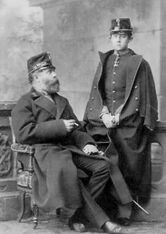Ivas VI of Talland
| Ivas VI | |||||
|---|---|---|---|---|---|
| King of Talland, President of the Biggonian Confederation | |||||
 Ivas VI in 1859, upon hearing of his father's death during the Siege of Prinzporte | |||||
| Reign | 12th August 1849 - 2nd Febuary 1901 | ||||
| Coronation | 8th June 1850 | ||||
| Predecessor | Ivas V | ||||
| Successor | Charles V/I | ||||
| Born | 8th August 1838 Ivasburg, Talland, Biggonian Confederation | ||||
| Died | 2nd February 1901 (age 63) Ivasburg, Talland, Biggonian Confederation | ||||
| Spouse | |||||
| Issue | Charles V, Emperor of Biggonia
Gottliebe, Princess of Talland Otto Raeisi, 6th Viceroy of Domlandia Jasmine Tallandos, Princess of Biggonia | ||||
| |||||
| Father | Ivas V | ||||
| Religion | Virtulima | ||||
Ivas VI of Talland was King of Talland from 1859 until his death in 1901. Throughout the same period, he also held the position of President of the Biggonian Confederation. Ivas VI was the last Biggonian monarch to rule before the Biggonian Empire, and although he was not the final President of the Confederation, his son Charles V's adoption of the title was a mere formality as he shortly thereafter coronated himself as Emperor of Biggonia. During his tenure as President, Ivas VI transformed Biggonia onto the path of becoming a great power, as he successfully unified the disparate kingdoms into the Biggonian Confederation and created an adminastrative structure which outlasted the Biggonian Confederation, forming the basis of the Biggonian Empire's own structure. His legacy today is highly celebrated but also controversial, as he refused to consider creating any public input on the Biggonian Confederation's structure, which would bleed into the Biggonian Empire's structure with devastating effect. Although not a reactionary or arch-conservative, Ivas VI today is considered as a King who had little care for what he considered to be details like press freedom and elections, instead looking at grand designs such as Biggonian unification, economic growth, and reassertion of the colonial empire. Ivas VI is the only non-Biggonian Emperor to have been posthumously granted a regnal Imperial title, due to his substantial impact on the later Biggonian Emperors.
Early life
Ivas was born on the 8th August 1838, at roughly midday. He was the first child of King Ivas V, who had become President of the Biggonian Confederation the previous year. At the time of Ivas VI's birth, his father was 38 years old, having been born on the 10th December 1799. His birth was officialy announced in a royal proclamation on the 14th August 1838, and he was named on the same day. Ivas would ultimately have three other siblings: Jakob, Count of Southbridge; Ricardina, who became the Archduchess of Suddereich; and Princess Zarah of Talland, famous for her numerous artistic pursuits and refusal to marry.
During his youth, Ivas was educated in both Ivasburg and Southbridge, with Southbridge being especially important for his later actions since it served as the de facto capital of the Biggonian Confederation during this time. Due to his father's frequent absences, he spent lots of time with his tutor General Nadal Schmidt, who was born in 1809. The two became very close throughout the years and it was rumoured that the childless Schmidt treated the prince as his son. Schmidt taught him lots about military strategy, and they would frequently discuss the ideal methods to conduct warfare and fight battles, especially as Ivas began his career in the military. In particular, they each had contrasting perspectives on whether advancements in artillery and rifle technology would lead to wars occurring faster or slower. Whilst Ivas believed the greater destructive potential and repeating firepower available to infantry would advance conflicts, Schmidt stated that the ease of operation for modern infantry weapons meant armies and conscription would only expand, leading to larger armies which prolonged wars further.
Many historians believe that in later life Ivas came round to Schmidt's way of thinking, as he devised several conscription schemes with tiered expansion of new conscription classes. Ivas also said in numerous speeches near the end of his life that if a global war were to break out between the Lexa Accords and alternative bloc like the Hanseatic Empire or Latin League, it would be the longest and bloodiest major war to date. His words were ominously proven true in the Great War, which ultimately broke out in 1923.
Military Career
When he was 16, in September 1854, Ivas was inducted into the Royal Tallandic Army to train and learn more about military matters. As the Crown Prince of Talland, a role in the cavalry was seen as befitting his station.
Later Life and Death
Despite being despondent towards work from 1889 onwards, Ivas VI's previous tireless dedication to Biggonia combined with the immense respect he commanded from the other provinces and courtiers led to there being a hope that he may return to governance, especially considering his relative youth of just 51 years old when despondency set in. Fortunately, the federal structure created by King Ivas enabled Biggonia to run relatively unscathed during his absence, and he gradually allowed his son Charles to take over more and more roles from him. Some historians believe that Ivas' lack of faith in Charles as a leader and anxiety towards his lack of grandchildren contributed to his anxiety and despondency. He suffered repeated bouts of illness throughout the period, and in 1896 was finally persuaded to retire from public life and transfer all active duties to his son Charles, however he retained the office of President due to the respect held by other provinces.
In 1899, Charles' first and only son was finally born, known as Josef, who would grow up to become Emperor Josef I, arguably one of Biggonia's most significant Emperors. Although at the time little of this was apparent, the mere existence of a grandson made Ivas far more confident that his line and the Biggonian Empire which he had worked so hard to create would endure. Furthermore, Ivas took an active role in the early parenting of the young Josef, and he often compared it to the development of his own son Charles, remarking that from a young age baby Josef displayed far more aptitude, intelligence, and resilience than his father.
The birth of Josef is thought to have been the catalyst for the unusual return to health experienced by Ivas VI, as he became far more active once again in government for the final year of his life. Although some were hopeful this could signal a return to governance for the still young King aged just 61, he understood that his time was limited. Although offered the title of 'Emperor' on numerous occasions, Ivas repeatedly turned it down, saying he had created the Biggonian Confederation but that the glory of the Empire was for the future generations. Nevertheless, he wrote down a substantially detailed list of instructions for how power should be transferred to his son Charles, and how he would be immediately crowned as both King of Talland and Emperor of Biggonia. In this way, Ivas VI was instrumental in finalising the transition from Confederation to Empire.
Unfortunately, Ivas' return to health would not last. The extraordinary energy he displayed in governance, setting his affairs in order, and even parenting for Josef (he wrote numerous letters to Josef's future self and created voice recordings with advice) put a massive tax on his ailing body. Ivas fell ill again in late November 1900, and ultimately succumbed to illness on the 2nd Febuary 1901. The announcement was broadcast over the radio to all Biggonia, and a long mourning period of an entire month ensued, where the King's funeral took place. Just four days after the mourning period ended, however, on the 6th March 1901, massed celebrations occurred as Charles V of Talland was coronated both as King of Talland but also formally acclaimed as Charles I, Emperor of Biggonia. After a unanimous vote by the Imperial Diet, it was decided that Ivas VI should recieve the posthumous name Akepearcheh, meaning 'Unifier'.
Legacy
Ivas VI's legacy has been invoked many times, by both Centralists and Federalists, as each attempt to argue that he supported their views. Centralists argue that Ivas VI set Biggonia on the course to current unification, and simplified the administration to function across all of Biggonia. Similarly some of his reforms such as the creation of a unified General Staff and central bank; as well as the encouragement of provinces to commit more resources to the Biggonian Imperial Army rather than their own armies; has led centralists to argue that he ultimately supported a unitary system of government for Biggonia.
On the other hand, Federalists believe Ivas' centralising reforms cannot be compared to attempts of centralism today, and were still in line with the ideals of federalism. The process towards unification in other nations was far more drastic than that of Biggonia, and Ivas VI tolerated the continued existence of provincial- and even prefecture- armies. They argue that Ivas was ultimately a believer in Biggonia as a federal nation, and that his centralisation through institutions like the central bank, General Staff, and Imperial Army was a necessity for the modern age. This was the viewpoint taken by many historians in the 20th and early 21st centuries, crediting the Biggonian Empire's strong provinces to Ivas- when Empress Ricardina was impeached in 2021 for apparently violating the rights of Biggonian provinces, many speeches praised Ivas VI's foresight to grant the Imperial Diet impeachement powers, saying that this was precisely his intention when granting them. For his support to federalism, the Imperial Diet decided to position Ivas VI atop the 'Monument to the Empire' when they were redesigning the Diet square in 1981.
Ivas VI has many monuments devoted to him. Perhaps most interestingly is his own statue in the Imperial palace square, an honour typically reserved to former Biggonian Emperors. Similarly, Ivas VI is the only non-Emperor of Biggonia to be granted a posthumous regnal name, which was declared as 'Akepearcheh', roughly meaning 'Unifier'. His statue is the first in the chronological order of Biggonian Emperors, again suggesting that he was a Biggonian Emperor rather than a simple Confederation President.
Ivas VI was renowned for his obsessive wargaming of the Siege of Prinzporte, with it ultimately being adapted and released as a board game by the company "Schuster's" in 1967. It has since become a game infamous across both Biggonian and international households for its optional complexity. The board game's manual opens with a tribute to King Ivas VI, acknowledging his posthumous name and thanking him for his contributions to Biggonia.

